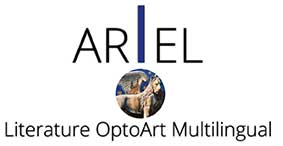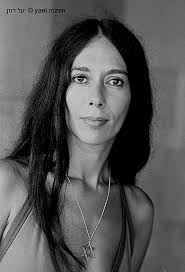Wallach was born on June 10, 1944 in Mandate Palestine in Petach Tikvah[1] and raised in Kfar Ana, a small village that had been ethnically cleansed[2] by the pre-state Jewish forces of the Alexandroni Brigade prior to the outbreak of the 1948 Arab–Israeli War[3]. Wallach lived in Kfar Ana with her mother for most of her life, until her death from breast cancer on September 26, 1985. She never got married and never left Israel for any period of time[4].
As an adolescent she suffered from severe psychic problems and was two times admitted to a psychiatric hospital, where she was treated among other drugs with LSD. In her early poems, which abound with psychedelic imagery and dream-like logic[5], Wallach tried to come to terms with these experiences.
Wallach was active in the “Tel Aviv poets” circle which emerged around the journals Achshav and Siman Kriah in the 1960s, and was a frequent contributor to Israeli literary periodicals. She also wrote for and appeared with an Israeli rock group, and in 1982 her poetry was set to music and a record released[6].
Her work combines elements from rock and roll, Jungian psychology and street slang in a body of work known for its breakneck pace and erotic imagery. She wrote in fluid lines, refusing to be limited by any conventional poetic structures.
Overall, five poetry books of Wallach appeared, four prior, one after her early death: Dvarim (Things) in 1966, Shnei Ganim (Two Gardens) in 1969, Shirah (Songs) in 1976, Zurot (Shapes) in 1985, and Mofa (Performance) in 1985[7].
Already her very first poetry book revealed the important contributions Wallach made to Hebrew poetry: the invention of a poetic language free of the heavy weight of traditional references, which was capable of speaking more freely and creatively of one’s own inner perceptions and personal experiences; the liberation of erotic expression from bashful prudery, and the deconstruction of gender boundaries together with an outspoken showmanship of femininity in an excessively male predominated culture.
Many of her poems, particularly the later ones, are defined by the quest of the “light of the soul…/the infinite…/the secrets of creation.” Unceasingly attacking and questioning Jewish cultural boundaries Wallach, in fact, managed, as the only Israeli poet of her time, to offer in her work more than a key-hole view into non-Jewish traditions and cultures. “Fleeing fixed gender identity, she seems to have understood that the goal of the female struggle is to revoke the “death-dealing binary oppositions of masculinity and femininity” so that a new approach to human identity may evolve, based solely on interchangeable individual characteristics”.[8]
Wallach introduced into Hebrew poetry explicitly sexual terms, such as “clitoris”, “prick” or “masturbation”, so far considered vulgar and being carefully avoided even by such erotically inspired poets as Yehuda Amichai or Dalia Ravikowitz. While both Ravikowitz and Amichai only used allusive eroticism, Wallach quite bluntly got down to the nitty-gritty. Nevertheless, it should not be forgotten that it was Amichai who had paved the way for Wallach in that he was the first to rid Hebrew of the clichéd erotic repertoremes[9].
Wallach also often interlaced erotic subversion with anti-Orthodox provocation, such as in her poem Tefilin. This famous poem (see below), published in the literary journal Iton 77 in 1982, broke both religious and puritan Israeli taboos with the daringly provocative use of the sacred object of prayer, the phylacteries, for sadomasochistic sex. It subsequently aroused such a scandal in Israel that the editors felt obliged to obsequiously publish an apology in the next issue of Iton 77. Nevertheless, subversive poets, such as Wallach, remained rather mariginal until the late 1970s, when feminist trends more and more started to infiltrate Israeli culture.[10]. Only posthumously, particularly in the 1990s, Wallach received a broader recognition in the main stream literary circles. Nevertheless, and remarkably enough, already during her lifetime, Wallach garnered the Tel Aviv Foundation Award twice (1973; 1977), the Kugel Prize (1978) and even the Prime Minister’s Prize (1978).
.

